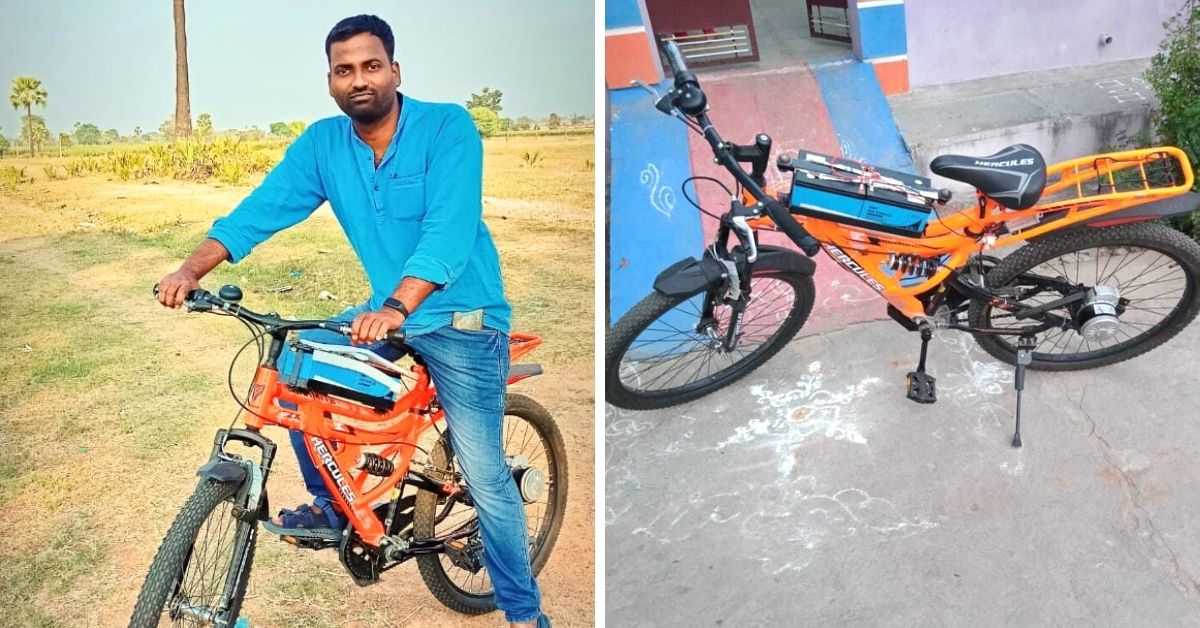From his home in Warangal’s Gopalapuram village, Rajkumar Mupparapu would have to travel 20 km everyday, to his office in Girnibavi. The long-distance travel demanded a high amount of fuel for his bike, and the recent fuel prices only made matters worse.
In fact, from his usual expenditure of Rs 3,000 a month, the rise in fuel costs increased his expenses to Rs 5,000 to cover the same distance. The additional cost became unfeasible, and Rajkumar knew he had to find a cost-effective solution.
He turned to his father, Rajamallu, an electrician, for guidance. Their discussions sparked the idea of building a battery-operated cycle.
In ten days, and by spending less than Rs 20,000, Rajkumar came up with a solution to power the bicycle with a battery and motor. He says he spends no money on charging the batteries with electricity, as they use solar power instead. A single charge for an hour enables the bicycle to cover a distance of about 25 km.
‘How I did it’

A graduate in science, Rajkumar says that during discussions with his father, he recalled some childhood aspirations. “When I was in Class X, I dreamt of buying a bicycle that would run on battery power. But I never had the money to experiment, nor the knowledge to pursue it,” he tells The Better India.
Rajamally decided to help his son with the required assistance. “Money was still a problem, and I could not afford to buy a new product commercially. Hence, I borrowed some money from my friends and father. In February 2021, I bought a bicycle for Rs 8,000 and spent another Rs 10,000 to buy two batteries of 12 volts each, a 40-watt solar panel, a controller and a 24 volt free-wheel DC motor that works as a motor to drive the bicycle wheel,” he explains.
Within ten days, the bicycle was ready. “I attached the batteries on the rod between the seat and handle. The free-wheel motor was attached to the rear wheel of the bicycle. I connected the battery to the motor to power it. The controller lines flowed from the motor to the handle, which would help throttle the vehicle,” he says.
Rajkumar says he attached the solar panel on the right-hand side of the carrier to expose it to the sun and charge the batteries.
“It worked as expected. The first drive was smooth with no complaints. I was overjoyed. I could easily ride to work and return without pushing the pedals. Moreover, the fix would save Rs 5,000 a month and cause no harm to the environment,” he says, adding that the bicycle rode at a speed of about 25 km an hour.
“It also rides double seat, but the distance covered would be comparatively less. However, you could always pedal in case the batteries fall short,” he says.
Adopting a sustainable lifestyle
Watch Rajkumar ride e-bicycle with comfort on congested city road
That Rajkumar was able to ride to work at the push of a button drew the awe and attention of many. “People turned their heads in both amusement and awe when they would see the bicycle gliding effortlessly down the road. I started removing the solar panel before the ride as it drew unnecessary attention and looked odd,” Rajkumar says.
He started receiving inquiries from people in the neighbourhood. “They wanted me to convert their bicycles into e-bikes. I offered them the services for Rs 10,000, leaving a Rs 1,000 profit. So far, six people have converted their bicycles, and I am receiving inquiries from Agra, Uttar Pradesh and other corners of the country,” Rajkumar says.
One such person Nampalli Rajkumar says, “I converted my bicycle to run on the solar-powered motor. I feel less tired using it as I rely on the motor to ride on steep climbs. It also enables me to travel long distances.”
Rajkumar adds that he is putting these requests on hold as his workshop is too small to handle the load, and that he has only two technicians working for him. “I am working on expanding operations and building it into a business. If I receive any financial or technical support from the government or local administration, the bicycles could get converted at Rs 6,000,” he says.
Edited by Divya Sethu
No comments:
Post a Comment